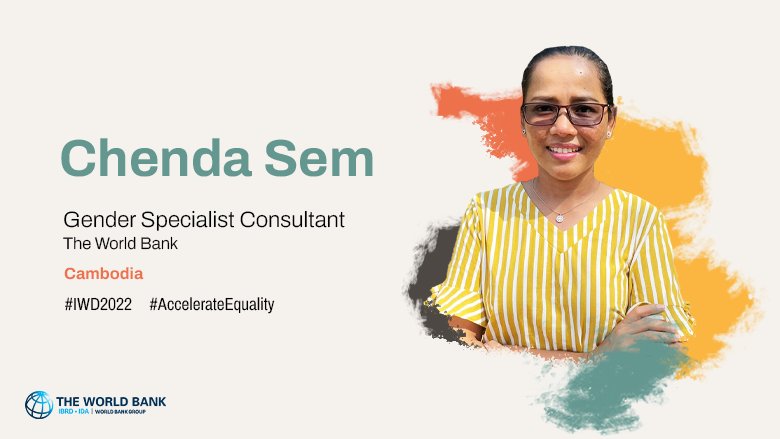I witnessed violence against women in my home village, communities, and schools; and when I had the opportunity of working to promote women’s rights, I took it. I have been working on gender issues for more than 10 years. Assisting vulnerable women and survivors of gender-based violence has become my personal and professional commitment. I am inspired when I know that my work has helped others. I am inspired when I can see more women and girls are empowered and exercising their human rights.
- Focused—With my experience, I can work to cover different aspects around gender equality, including policy, analytical work, capacity development, behavior change and gender responsive programs, and project design and operation.
- Self-confident—I am confident to promote gender equality and strive for change.
- Empowering—I have worked with women and young students to engage in the public and private sectors. I tried to help young women living in rural areas to access opportunities through project operations and other organization of public events.
This year's theme is 'Equality today for a sustainable tomorrow.' In your eyes, what is the intersection between climate change and gender equality?
Although we have seen the promotion of women’s empowerment in Cambodia, more concrete actions in implementation are necessary to accelerate gender equality in a sustainable manner. Many women have limited access to the information, skills, and technology to adapt their income-generating activities to climate challenges. To promote gender equality and ensure sustainability, we need to address the gender gap in various sectors, especially with a cross-cutting theme on climate change.
Can you tell us about your work on gender and development in Cambodia?
I started working for the World Bank in Cambodia in early 2018 as a gender specialist consultant. I have been working to promote gender equality across the Bank’s projects. Currently, I am working with the Community-Based Childcare for Garment Factory Workers (CBCC) project to help promote women’s economic participation and child development outcomes. I think childcare challenges for women need to be addressed in Cambodia. Investing in childcare options is a step toward women’s economic empowerment and the improvement of human capital development.
I am also involved in the Livelihood Enhancement and Association of the Poor Project (LEAP). This project is helping its beneficiaries, mostly rural women, through equitable access to financial services, skills, technologies, networking, market linkages, and key value chains. LEAP also helps improve basic services and community infrastructure for rural and urban poor.
What does good leadership mean to you?
To me, good leadership means for an individual to have the capacity and practical skills of to lead, influence, and guide other people, teams, organizations, and communities.
Why is it important to have female leaders?
Women have equal rights with men to participate in all employment sectors and leadership positions. Representation and participation of women in leadership roles is important to promote women’s working potential and to benefit other women in their communities. Based on past experiences in local communities, female survivors of gender-based violence are more comfortable with support given by female service providers than male ones—including counseling, health care, legal services and providing a safe shelter. As such, the role of female leaders is to help sensitize society to issues faced by women and girls and ensure their needs are better met through policy development and provision of services.
What have been the biggest lessons you have learned as a leader?
I have learned about the differences—personality and behavior, culture, and ways of working.
Being a leader, understanding and respecting the differences is important to making sure that teams can work well together to achieve the same goal.
I think we need to continue empowering women, providing equal and equitable opportunity for them, and engaging men and boys to join the movement. We need a more equitable and flexible approach to promote women’s representation and participation.
Because most leaders and decision makers are men, it is important to raise their awareness of gender issues and work with them at the institutional level to formulate and implement gender-informed policies. At the family level, men need to engage in promoting women’s participation in leadership roles. In some past experiences, women in a leadership position without family support faced challenges, since they were expected to take full responsibility of domestic work at the same time. Many women lacked support from family and male leaders to participate at their full potential.
I would advise them to continue learning to be self-empowering and self-confident in whatever work they do. Continue learning to work with different kinds of people. It is also important to note that, to become a leader, you must stive to be a role model for others. Leaders need to keep practicing integrity, fairness, equality, equity, and quality of work.
I think investment and concrete actions are needed to accelerate gender quality and for a sustainable tomorrow. In Cambodia, we have policies and strategies in place. The implementation of these polices and strategies needs to be strengthened in systematic way. The central and local governments and partners shall strengthen capacity and operation of gender-responsive budgeting, which is considered a core element to systematically accelerate gender equality and sustainability of quality.
I hope for substantial equality in which women and girls can fully exercise their human rights in private and public spheres. I hope to see more women become leaders and decision makers. In the future, I will keep sharing my knowledge with others to help empower women and girl.
**The views expressed in this interview do not necessarily represent the views of the World Bank Group.

